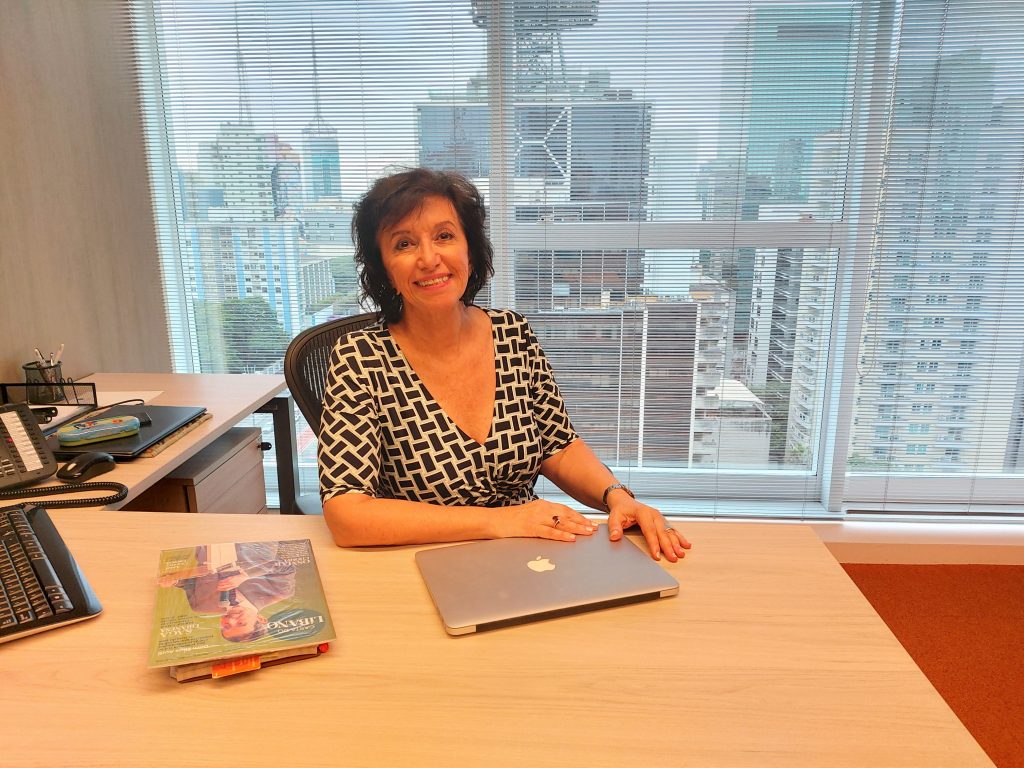São Paulo – When the phone of the Arab Brazilian Chamber of Commerce Cultural director Silvia Antibas rang on May 18, she thought: “I won!” And she did. That call from Paris, France, told her she was one of the recipients of the 2019 UNESCO-Sharjah Prize for Arab Culture, given by one of the seven emirates of the United Arab Emirates and the United Nations Educational, Scientific and Cultural Organization (UNESCO). Palestinian artist Suleiman Mansour was the other recipient. The award is a recognition of a long career dedicated to the spread of the Arab culture as a world heritage.
“I try to break stereotypes about the Arab culture, seek to encourage shows of contemporary art, the women’s presence and production in the Arab cultural world. And the Arab Chamber gives me a chance to do this,” Antibas said.
Her father was born in Antioch, Syria (currently Antakya, Turkey), then part of the Ottoman Empire, and moved to Brazil when he was nine after leaving his homeland with her grandmother, travelling to Italy and, from the Port of Genova, arriving in Brazil. Her mother is the daughter of Lebanese parents from the town of Marjayoun in South Lebanon who settled in Pederneiras, São Paulo. They met when Antibas’ father, who worked as a peddler, was traveling upstate to sell his products. “I’ve always had Arab references in my family. I can still remember my father’s habits and even Italian expressions he had learned on the ship. I loved hearing about those memories,” she says.
The stories of her family and her innate curiosity led her to study History in college, visit cities such as Ouro Preto and Mariana, Minas Gerais, and countries that hold treasures of the world heritage. These experiences made her the historian that since the early years in her career has ran institutions and held cultural projects.
And one of these projects – but not the only one – led Antibas to the UNESCO-Sharjah Prize for Arab Culture. She was nominated by the director of the Latin American Studies and Cultures Center (LASCC) at Lebanon’s Holy Spirit University of Kaslik (USEK), Roberto Khatlab, with whom she develops an immigration history digitization project being rolled by the Arab Chamber and USEK.
In public administration, Antibas hold office as director at the Department of Museums and Archives (DEMA) and coordinator at the Unit of Cultural Diffusion, Libraries and Reading of the Culture Secretariat of the State of São Paulo. As a public servant of the State of São Paulo, Antibas participated in the construction and opening of Sala São Paulo, the restauration of the Pinacoteca do Estado de São, Paulo, the creation of the Museum of the Portuguese Language and the Football Museum, as well as the São Paulo and the Villa-Lobos Park libraries.
Besides these challenges, Antibas has always been in contact with the spread of the Arab art, including researching the influence of the Arab music on the Brazilian music as well as curating events and promoting Arab-descendant Brazilian authors in the Middle East and North Africa countries. Antibas took over as Cultural director at the Arab Chamber in 2013 at the invitation of then president Marcelo Sallum. She was first invited to write a book on the Arab Chamber and shortly after to took over as director at the institution.
“The Arab Chamber is a business promotion institution but has always understood very well the role of the culture. After all, culture can help bringing peoples together and doing business. Moreover, I’ve always felt at home being a woman director, with a feminine and cultural regard on the Chamber’s issues,” she says.
The projects don’t end there. Antibas support the creation of an Arab cultural center that unifies the different Arab culture promotion and encouragement initiatives across Brazil. “More institutions need to engage. The Arab Chamber has made a huge effort to show the existence of dialogue and respect towards the other, and this led to the UNESCO’s recognition,” Antibas said. Therefore, that phone call from Paris was not at random. “I’m extremely happy to know that everything I did was worth it, and I feel fulfilled for having the chance to work with what I like,” Antibas says.
*Story by Marcos Carrieri, specially for ANBA
Translated by Guilherme Miranda




